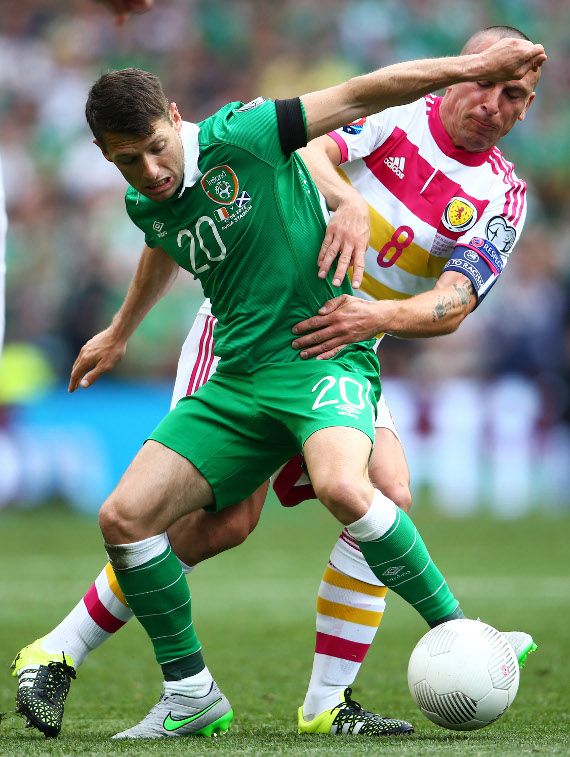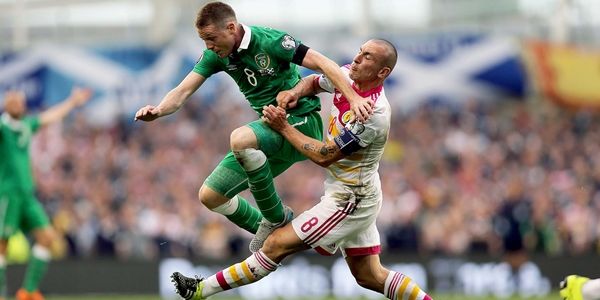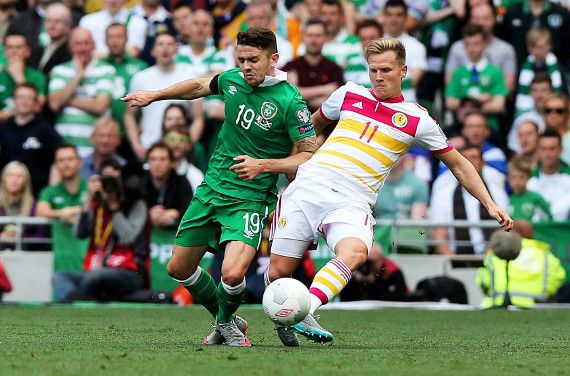

Share
13th June 2015
08:38pm BST

 One could argue, and O'Neill certainly would, that such lapses can’t be pinned on the management team, that the players need to be switched on and they’d be right. But the areas where the manager could have a direct effect, team selection and substitutions, there’s a strong argument to make that O'Neill got it wrong.
When Robbie Keane’s number went up, a massive cheer echoed around the Aviva. When the Irish fans realised he was replacing Wes Hoolahan, those cheers sharply turned into boos.
Eamon Dunphy, and John Giles to an extent, has almost done his favourite Ireland player a disservice. The RTE pundit has fervently championed the Norwich playmaker, to the point where he claimed last week that the manager’s view that the player is more suited to starting in home games is a sack-able offence. While Dunphy’s view is extreme to say the least, any subsequent praise for Hoolahan can be seen as buying into the hype around the player. However, this is to do Hoolahan a disservice, because he proved today that he is Ireland’s best player.
The Dubliner was excellent throughout. There was a passage of play in the first half when Hoolahan was on Ireland’s right side in the final third, an Irish midfielder had the ball and looked for Hoolahan to pass to. However, he made a gesture, telling the player to hold off from passing, then gestured for Coleman to push on. Hoolahan drifted in-field, dragging Scotland’s left back out of positon and creating the space for Coleman, who ran onto the through ball before delivering (another) poor final pass.
However, this passage of play shows how influential Hoolahan was to Ireland’s play, and how dumbfounding it was to take him off the pitch with twenty minutes left. Hoolahan was involved in almost everything positive from Ireland, weaving his way around the pitch, and away from the opposition who tried to bully and push him around. It didn’t work and Hoolahan continued to find space, continued to try make things happen and worked hard when out of possession.
One could argue, and O'Neill certainly would, that such lapses can’t be pinned on the management team, that the players need to be switched on and they’d be right. But the areas where the manager could have a direct effect, team selection and substitutions, there’s a strong argument to make that O'Neill got it wrong.
When Robbie Keane’s number went up, a massive cheer echoed around the Aviva. When the Irish fans realised he was replacing Wes Hoolahan, those cheers sharply turned into boos.
Eamon Dunphy, and John Giles to an extent, has almost done his favourite Ireland player a disservice. The RTE pundit has fervently championed the Norwich playmaker, to the point where he claimed last week that the manager’s view that the player is more suited to starting in home games is a sack-able offence. While Dunphy’s view is extreme to say the least, any subsequent praise for Hoolahan can be seen as buying into the hype around the player. However, this is to do Hoolahan a disservice, because he proved today that he is Ireland’s best player.
The Dubliner was excellent throughout. There was a passage of play in the first half when Hoolahan was on Ireland’s right side in the final third, an Irish midfielder had the ball and looked for Hoolahan to pass to. However, he made a gesture, telling the player to hold off from passing, then gestured for Coleman to push on. Hoolahan drifted in-field, dragging Scotland’s left back out of positon and creating the space for Coleman, who ran onto the through ball before delivering (another) poor final pass.
However, this passage of play shows how influential Hoolahan was to Ireland’s play, and how dumbfounding it was to take him off the pitch with twenty minutes left. Hoolahan was involved in almost everything positive from Ireland, weaving his way around the pitch, and away from the opposition who tried to bully and push him around. It didn’t work and Hoolahan continued to find space, continued to try make things happen and worked hard when out of possession.
 Would Ireland have scored if Hoolahan stayed on the pitch? There’s no way to know for sure, but the life was drained from Ireland’s midfield, making the decision take him off was hard to fathom. As was, despite a decent performance, playing Daryl Murphy at the expense of Shane Long. The Ipswich forward showed little in the game against England that would suggest he should start today. While Long finished the season well, scored in Ireland’s last competitive game and possessed the pace to trouble Scotland’s relatively weak defence, particularly left-back Craig Forsyth.
O'Neill could’ve played Walters up front and Long wide, where he often plays his club football, but the Tipperary native was left with far too little time to make an impact. Murphy didn’t do anything particularly wrong, but there were passages of play where Long’s pace would’ve got him away from the Scottish defence.
With Keane not starting, Long must be thinking what exactly he has to do to earn a starting spot. It seems patently clear that O'Neill doesn't trust the player.
Would Ireland have scored if Hoolahan stayed on the pitch? There’s no way to know for sure, but the life was drained from Ireland’s midfield, making the decision take him off was hard to fathom. As was, despite a decent performance, playing Daryl Murphy at the expense of Shane Long. The Ipswich forward showed little in the game against England that would suggest he should start today. While Long finished the season well, scored in Ireland’s last competitive game and possessed the pace to trouble Scotland’s relatively weak defence, particularly left-back Craig Forsyth.
O'Neill could’ve played Walters up front and Long wide, where he often plays his club football, but the Tipperary native was left with far too little time to make an impact. Murphy didn’t do anything particularly wrong, but there were passages of play where Long’s pace would’ve got him away from the Scottish defence.
With Keane not starting, Long must be thinking what exactly he has to do to earn a starting spot. It seems patently clear that O'Neill doesn't trust the player.
 Ultimately though, the damage to Ireland’s qualification campaign was done before today’s game. O'Neill’s side started slowly against Poland, readjusted and got back into the game as the visitors dropped off. In the loss away to Scotland, the result which will prove to be the decisive game for both sides, Ireland were overrun in midfield and offered little.
Very few, if any, accurately predicted Ireland’s line-up today, which doesn't reflect well on O'Neill. Over 18 months into the job, and half-way through the qualification campaign, and Ireland manager still doesn't seem to know his best first XI.
Following the game, O'Neill looked noticeably disappointed but claimed Ireland are still in contention to qualify. “We are still in the group,” the Ireland manager said. “This is not just fighting bravado talk, we are still well in the group. We have two games in September, we're going to take those and see where it leads us by the time we come into the Germany game.” Ireland will, in all likelihood, have a further six points by then, but so will all the other teams who face the group minnows Gibraltar and Georgia.
Ireland's slim hopes rest on getting results against Germany and Poland. After what we've seen so far from this team, and during O'Neill's tenure, does anyone think that's realistic?
The Ireland manager has been a victim of circumstance to an extent. The group draw has proved very unfortunate on Ireland, who were seeded second, and O'Neill was the victim of some poor luck in the form of Scotland's goal today. He also doesn't exactly have a world class squad of players to select.
However, in other areas, such as team selection and tactics, he has, unfortunately, come up short and in such a tight group, where there's little between Ireland, Poland and Scotland, this looks to have proved fatal for the team's chances of qualifying for Euro 2016.
Ultimately though, the damage to Ireland’s qualification campaign was done before today’s game. O'Neill’s side started slowly against Poland, readjusted and got back into the game as the visitors dropped off. In the loss away to Scotland, the result which will prove to be the decisive game for both sides, Ireland were overrun in midfield and offered little.
Very few, if any, accurately predicted Ireland’s line-up today, which doesn't reflect well on O'Neill. Over 18 months into the job, and half-way through the qualification campaign, and Ireland manager still doesn't seem to know his best first XI.
Following the game, O'Neill looked noticeably disappointed but claimed Ireland are still in contention to qualify. “We are still in the group,” the Ireland manager said. “This is not just fighting bravado talk, we are still well in the group. We have two games in September, we're going to take those and see where it leads us by the time we come into the Germany game.” Ireland will, in all likelihood, have a further six points by then, but so will all the other teams who face the group minnows Gibraltar and Georgia.
Ireland's slim hopes rest on getting results against Germany and Poland. After what we've seen so far from this team, and during O'Neill's tenure, does anyone think that's realistic?
The Ireland manager has been a victim of circumstance to an extent. The group draw has proved very unfortunate on Ireland, who were seeded second, and O'Neill was the victim of some poor luck in the form of Scotland's goal today. He also doesn't exactly have a world class squad of players to select.
However, in other areas, such as team selection and tactics, he has, unfortunately, come up short and in such a tight group, where there's little between Ireland, Poland and Scotland, this looks to have proved fatal for the team's chances of qualifying for Euro 2016.Explore more on these topics: